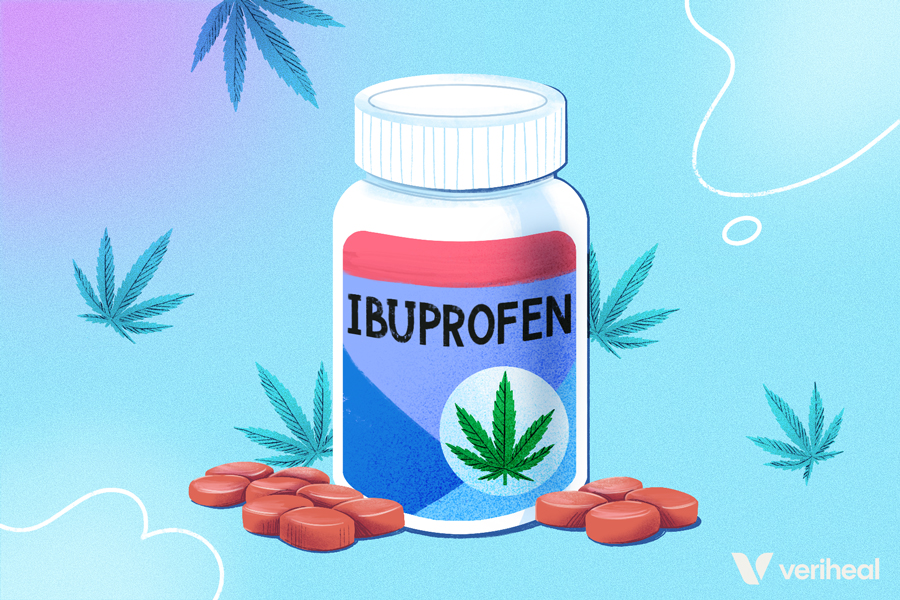Currently, numerous scientific studies support using cannabis for pain and inflammation. For example, a noteworthy study published by the Journal of the American Medical Association (JAMA) in 2015 demonstrated that patients with chronic pain experienced a significant reduction in pain symptoms after using cannabis, highlighting its potential as a viable treatment option.
Additionally, a comprehensive review of 28 studies published in JAMA in 2016 found that marijuana effectively treated chronic pain in adults, further strengthening the case for cannabis as an alternative pain management therapy. But what happens when used in conjunction with another popular anti-inflammatory like ibuprofen?
Whether it’s to treat a headache or inflammation after a long day at work, this symbiotic pairing can really get that pesky pain out of your life—assuming you do it safely. But here’s the thing: there are some essential safety facts about combining ibuprofen and marijuana that rarely get discussed—so today, we’ll be diving into those nitty-gritty details. Continue reading to discover essential information before incorporating both substances into your pain-relief regimen.
What Is Ibuprofen?
Ibuprofen is a nonsteroidal anti-inflammatory drug (NSAID) that works by reducing inflammation, pain, and fever in the body. It has many uses, such as treating headaches, menstrual cramps, toothaches, and even muscle aches.
However, it’s important to be aware of common side effects, including upset stomach, heartburn, and dizziness. Keep in mind that these side effects are usually mild and can be managed by following dosage instructions and taking the medication with food or milk.
The Science Behind Using Ibuprofen and Cannabis
Ibuprofen works its pain-relieving magic by inhibiting the production of prostaglandins. Prostaglandins are like messengers that tell the body to react to things like injury or swelling. They play a role in how individuals experience pain, develop fevers, and how their blood vessels change size.
Ibuprofen works by stopping an enzyme (a kind of protein that helps chemical reactions happen) called cyclooxygenase (COX), which exists in two forms: COX-1 and COX-2, from making these prostaglandins. By blocking the activity of both COX-1 and COX-2, ibuprofen effectively reduces the production of prostaglandins, leading to decreased inflammation, pain, and fever.
Conversely, marijuana acts explicitly on the endocannabinoid system (ECS), which helps regulate pain perception, inflammation, and stress response. The ECS consists of two primary receptors: cannabinoid receptor type 1 (CB1) and cannabinoid receptor type 2 (CB2).
CB1 Receptors and Pain Response
CB1 receptors are predominantly found in the brain and central nervous system (CNS). They play a significant role in modulating pain signals by inhibiting the release of neurotransmitters involved in pain transmission.
Activation of CB1 receptors can lead to pain relief, especially for neuropathic pain, by reducing the excitability of neurons responsible for transmitting pain signals. The psychoactive effects of cannabis, primarily attributed to the compound tetrahydrocannabinol (THC), are also mediated through the activation of CB1 receptors.
Why You Should Get Your Medical Marijuana Card
Veriheal has satisfied millions of patients nationwide by giving them access to these benefits
- Larger purchase limits
- Peace of mind
- Enhanced legal protection
- Access to higher potency strains
- Save up to 25% on cannabis purchases
- Skip the line at the dispensary
CB2 Receptors and Pain Response
CB2 receptors are mainly expressed in immune cells and peripheral tissues, playing a crucial role in regulating inflammation and immune response. Activation of CB2 receptors can help reduce inflammation and pain, especially in conditions with an inflammatory component, such as arthritis or inflammatory bowel disease.
Cannabidiol (CBD) is known to have a higher affinity for CB2 receptors, which may explain its anti-inflammatory and analgesic properties without the psychoactive effects typically associated with THC.
Both CB1 and CB2 receptors are involved in pain management through different mechanisms. CB1 receptors are primarily responsible for modulating pain signals in the CNS, while CB2 receptors help regulate inflammation and immune response, contributing to pain relief.
Interestingly, CBD has been shown to target the same enzymes as ibuprofen, COX-1, and COX-2. By targeting COX-1 and COX-2, CBD effectively inhibits the production of prostaglandins, resulting in reduced inflammation and pain. This shared mechanism of action with ibuprofen highlights the promise of CBD as a natural alternative for pain relief, particularly for individuals seeking non-pharmaceutical options to manage their discomfort.
By combining the prostaglandin-eliminating effects of ibuprofen with cannabis, the unique combination may offer synergistic effects, potentially enhancing the overall pain relief experienced by users.
Potential Risks Associated With Mixing Ibuprofen and Cannabis
Overall, no reported risks or serious adverse effects are associated with using ibuprofen and cannabis together. However, unlike long-term cannabis use, long-term ibuprofen use can pose several potential dangers.
Prolonged consumption may increase the risk of gastrointestinal issues, such as ulcers or bleeding, and contribute to kidney damage or liver injury. Furthermore, studies have linked extended NSAID use to an elevated heart attack and stroke risk.
To minimize these risks, following your healthcare provider’s guidance and taking the lowest effective dose for the shortest possible duration is essential.
In a Nutshell
Seeking relief from persistent pain can feel daunting at times, which is why it’s so inspiring to know that researchers are continuing to discover promising treatments. The combination of ibuprofen and cannabis is one such example, proving to be a powerful force in the world of pain management.
Working in tandem, they may offer an innovative approach to finding relief and greater peace of mind. Although side effects and interactions are important to consider, the advantages make combining ibuprofen and cannabis an option worth exploring. If you want further guidance on how this treatment could benefit you or access medicinal marijuana, connect with Veriheal today to apply for your MMJ card.
Note: The content on this page is for informational purposes only and is not intended to be professional medical advice. Do not attempt to self-diagnose or prescribe treatment based on the information provided. Always consult a physician before making any decision on the treatment of a medical condition.
Author, Share & Comments








